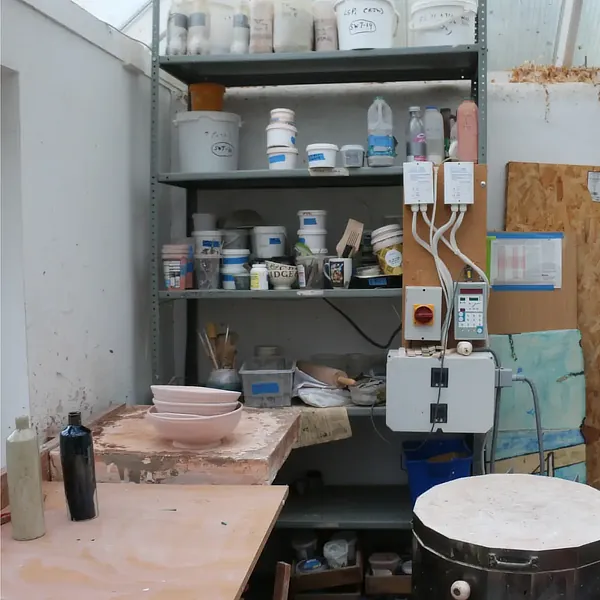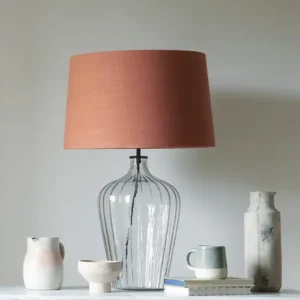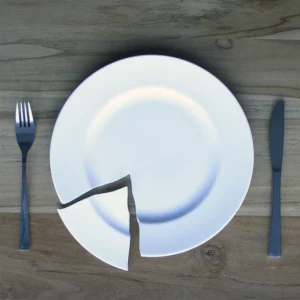Studio Health and Safety – Online Course
£145.00
In this online course you will learn about how to identify and resolve health and safety risks in your studio, over the whole making process from dealing with clay and other raw materials, through making and firing work to final packaging and disposal of waste. You will understand how to identify any potentially harmful materials in the studio, and how to deal with them. You will also get to understand good working practice in the studio, as well as appropriate clothing and the use of PPE. You will also be shown resources that you can use to help decide whether something is a significant risk or not.
Description
What is the course about?
This course gives you all the information you need to run a pottery studio safely, whether just for yourself or as a large teaching or community studio.
How is it Delivered?
The course is structured into eight modules (nominally weekly but you can decide on your own pace). Each module consists of a video presentation, a PDF of the presentation for you to download, and links to additional material (both on and off my tech website) that you may wish to explore if you want more detailed information on any aspects of the course.
You’re also encouraged to ask me questions about the course content and your practices during the course. This may be by email, or by participating in the monthly “Ask me Anything” video conferences for all my current students and Patreon supporters.
You have access to the course material for 12 weeks from your booking date. After that, you can have access whenever you want by supporting me on Patreon for the cost of buying me a cup of coffee each month.
What will we cover?
You will learn about how to identify and resolve risks in the studio, through the whole making process from dealing with clay and other raw materials, through making and firing work to final packaging. You will understand how to identify any potentially harmful materials in the studio, and how to deal with them. You will also get to understand good working practice in the studio, as well as appropriate clothing and the use of PPE. You will also be shown resources that you can use to help decide whether something is a significant risk or not.
The course doesn’t deal with the specific legal responsibilities of having staff, or of running a teaching studio, though the health and safety aspects are covered.
What will I achieve?
By the end of this course you should be able to…
- Identify hazards in your studio, and develop a method of resolving them. Be able to classify different levels of risk.
- Understand the basics of how substances may enter into and be expelled from the body; chronic and acute exposure levels
- Identify any potentially harmful substances in the studio, using the Safety Data Sheet (SDS), information on my web site and other information sources
- Understand the risks of dust (including silica and other materials); how to minimise the creation of dust; and how to manage it safely
- Decide on appropriate clothing and PPE for different activities, and how to use the PPE correctly
- Assess any physiological risks from lifting, wedging, throwing and other activities, and how to deal with them
- Understand the risks from various methods of firing, and how to manage them
- Be aware of the risks of machinery that may be used in the studio
- Know how to dispose of studio waste safely, being aware of any environmental risks
- Have a good overall understanding of good studio practice from a health and safety viewpoint
What level is the course and do I need any particular skills?
Beginner to intermediate.
You should have some experience of making and firing pots in a pottery studio, whether yours or somebody else’s.
How will I be taught, and will there be any work outside the class?
The course is primarily run through video lectures.
Additional material that you may wish to explore is on the course website. This will help you go deeper into the subject matter, should you wish to do so.
There will be suggestions for you to consider specific aspects of your studio between sessions.
Subtitles to the videos are available – if your language isn’t there. just ask!
Are there any other costs? Is there anything I need to bring?
No advance preparation is needed.
What do I get?
- Eight lectures, each lasting about 90 minutes
- Recordings of all lectures for later viewing during the course, with subtitles in all attendees’ languages
- Additional optional online course material, giving background info and greater depth
- Optional participation in monthly “Ask me Anything” live online discussion sessions
- Downloadable PDFs of all presentations
- Premium level access to the Tech part of my web site, containing much more information, references etc.
- Course attendance certificate
Note that the lecture recordings and premium level site access are included at no cost until 12 weeks after you sign up to the course. After that, continued access is available for the cost of buying me a coffee each month.






Wendy Gers –
Well prepared, interesting & informative course.
Wendy, London
Jo Hayes –
The course gives a good level of studio best practice, and health and safety, to those that have found ceramics later in life and haven’t trained from a young age or worked as Technicians. The course covers everything that may not be found on standard pottery courses for those that want to think about setting up their own studio. Tim is clearly very knowledgeable, and happy to share that knowledge to keep potters safe!
Jo from Newcastle, England
Susie Bidgood –
.
Susanna Vittay –
I am an amateur ceramicist with my own studio space in our garden shed. Without formal qualifications in ceramics I was a bit lost on how to deal with health and safety regulations and where to find them. This course was really useful and reassuring to me. The concise format and links to Tim’s website provide an excellent source to turn to, and are based on proper official guidelines. Thank you Tim!
Susie, Kent
Rachel Damerell –
Tim’s webinar sessions are packed full of precise information with useful PDFs to download. There is the opportunity to ask questions as the material is covered and the possibility of sending emails if thoughts arise after the session has ended. I have found this particularly useful and Tim’s replies have always addressed my questions with detailed and fulsome answers.
Rachel, Cornwall
Lindsay Stillwell –
The course was very well paced with an extensive breadth of information. As a tutor Tim was very accessible and helpful with any queries. His course provides amazing resources for followup though a donation is suggested in order to access some of this information.
Lindsay, Herts
Gwen Armstrong –
Tim shares incredibly well researched and clearly presented detailed key points for good health and safety practice in the studio. I have a much better understanding of food safety of glazes, which must be an essential for any maker of domestic pieces. A very interesting course with plenty of helpful interaction.
Gwen, Canterbury
Sofie Goethals –
Tim is a patient and thourough teacher who really knows what he is talking about. The course material is very well prepared and easily available. I followed two courses already and will probably take other classes in future!
Sofie from SOGO keramiek, Belgium
Cathy Cosby –
If you are planning to set up a pottery studio, then taking Tim Thornton’s course on Studio Safety for Potters is a must! Lots of valuable information and things to think about for your studio. Tim is willing to answer all questions and is very helpful. His research is very thorough and he shares links to additional information on his website. – Cathy Cosby, Norwich, CT, USA
Jane Lowth –
Tim has years of experience in Health and Safety, and has collected and collated vast amounts of data on the subject, particularly as it relates to pottery studios. He presented this carefully with real documented examples, and brought common sense answers to our questions. Discussion between participants in the live sessions was an added bonus. At the conclusion of the course, I have a few actions to take, and I feel confident that we are making sensible decisions about the safe running of our new teaching studio.
Heidi Leipnitz –
Tim’s course on Studio Health and Safety is filled with very practical considerations relevant to general studio practice and firing, both electrically or with a fuel source. I did this course in tandem with his course on Electric Kilns and found that the concepts complimented each other well.
Tim is very open to answering questions and addressing adjacent topics if there is group interest, in this case a small introduction to material safety assessment in relation to food.
This is a course that is very useful for potters setting up their own studio, and perhaps even more so for those working in shared studios or teaching environments.
Heidi (Copenhagen, Denmark)
Helen Adams –
I have now attended two of Tim Thornton’s online courses – Electric Kiln Course, and Pottery Studio Health & Safety. I have no hesitation in recommending Tim’s courses for anyone looking to enrich their knowledge and understanding. They are just perfect for helping you to learn what you need to understand in order for you to be a safe and competent potter.
One of the most important things about Tim’s courses, is that he is very generous with his time…and knowledge. It seems as though nothing is too much trouble for him.
I am a visual learner. I also like to gain the knowledge before I try out a new skill. These courses fulfilled both of my needs.
Thank you very much Tim.
Helen A, based in Bognor Regis